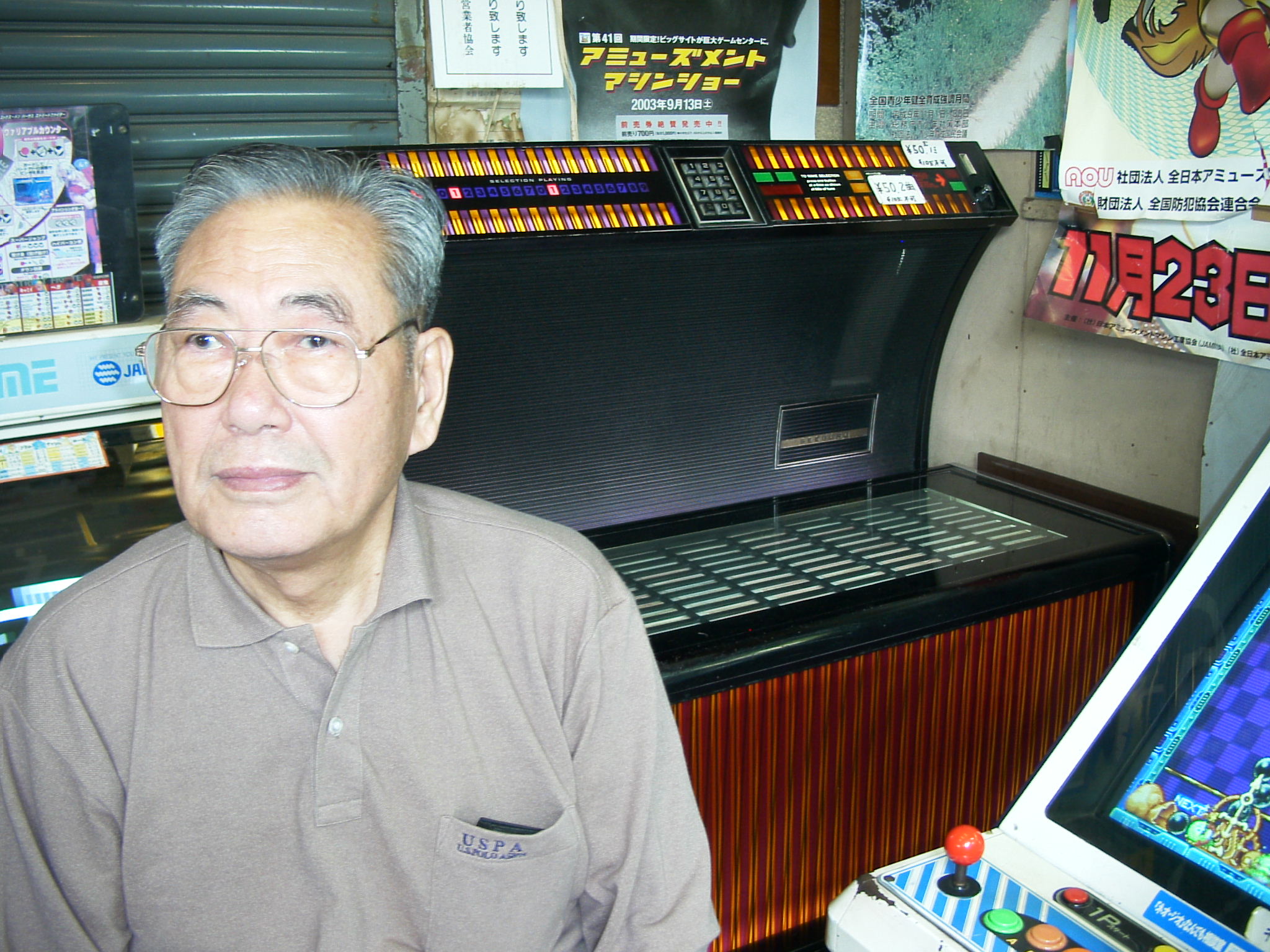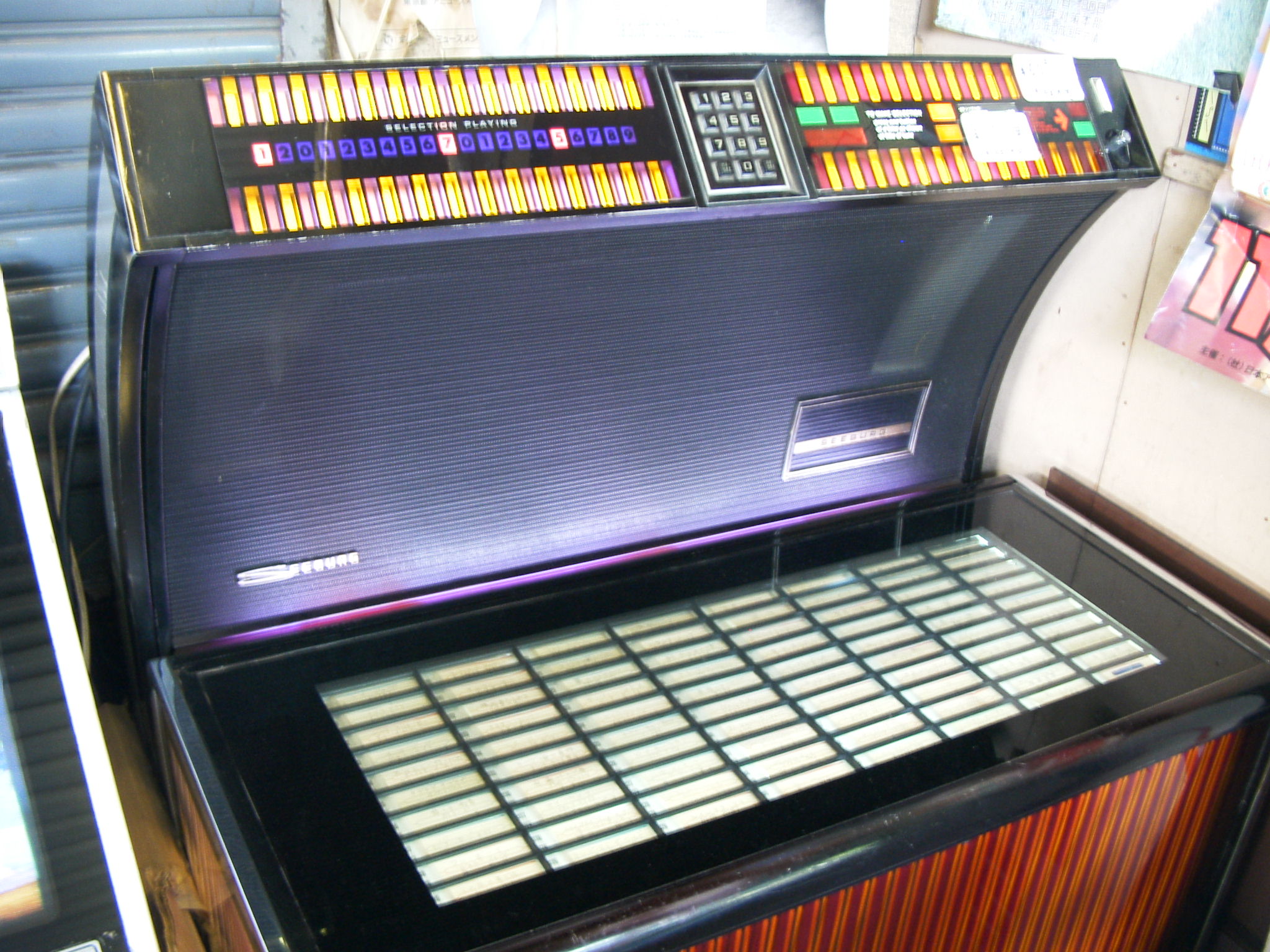この記事は2004年11月13日にデイリーヨミウリ紙に掲載されたものを、同紙の許可のもと再掲載しています。日本語抄訳はこちらをご覧下さい。
This is a reprint of the article that was published in Daily Yomiuri on November 13, 2004.
Wataru Doi Special to The Daily Yomiuri
In front of a small, old-fashioned game arcade in an old residential area in Ebisu, Tokyo, which contrasted with the stylish modern towers of nearby Yebisu Garden Place, a man who appeared to be in his 60s was standing alone one autumn evening.
He was listening to music that came out of the arcade, and out of the past. He comfortably spent 30 minutes there. After a long time, he spoke to 76-year-old Tokuzo Aramaki, who was sitting nearby.
"I never get tired of listening to the sound of the jukebox," the man said, prompting nods of agreement from Aramaki.
Jukeboxes have completely disappeared from most amusement places, and now are disappearing from people's memories as well. But Aramaki, the owner of the arcade Asobiba, has devoted his life to the automatic coin-operated phonograph machines.
His arcade, a one-minute walk from Yebisu Garden Place and outside JR Ebisu Station, is full of game machines that inspire nostalgia among visitors in their 40s and 50s. He may be proud of his pinball machines, and even his old bullet train game, but Aramaki's favorite device is the jukebox--of which he says there are only about 10 working examples left in Tokyo.
"I found a jukebox in Harajuku the other day, but it was just for display," he said with disappointment.
Aramaki makes his living as a specialized mechanic who has been maintaining jukeboxes and pinball machines for nearly 50 years. During World War II, he was a mechanic for the Imperial Japanese Army. After the end of the war, he decided to continue in the field "because I love machines," he said.
In the postwar era, the jukebox was a popular form of entertainment. American soldiers stationed in Japan enjoyed them at bars and restaurants around U.S. bases, using them to provide a musical accompaniment to games of pinball. From there, the jukeboxes caught on with the Japanese as well, giving Aramaki the chance to work on the machines every day. "It was golden era for jukeboxes and me," Aramaki said.
About 37 years ago, he decided to run his own business, starting a company that sold, leased and maintained jukeboxes and pinball machines. He used an Ebisu garage as a workshop. Riding a boom, his business went well. He opened a branch office in the hot spring resort of Kinugawa, Tochigi Prefecture, where the demand for amusement machines was exploding.
The 1960s were a time when Japanese amusement companies began importing well-known U.S. jukebox brands such as Rock-Ola, Seeburg and Wurlitzer. At first, these U.S. machines dominated the market.
Then, a few Japanese companies began manufacturing jukeboxes. Sega, a major amusement machine company even then, succeeded in developing the first made-in-Japan jukebox, the Sega-1000, selling 3,000 units in 1962.
Photos by Wataru Doi
Tokuzo Aramaki in front of his jukebox
in his game arcade in Ebisu, Tokyo.
Aramaki's favorite Seeburg's jukebox.
When he talks about jukeboxes, Aramaki looks happy. "Each manufacturer had its own character. Seeburg's sound was not as good as others, but its mechanical workings were robust and well-designed and needed less maintenance. Rock-Ola's and AMI's machines had good sound. Sega's machine was cheap and welcomed by Japanese restaurants. Unfortunately, all of them are out of the jukebox business now."
The jukebox in Aramaki's arcade is a 27-year-old Seeburg, his favorite, which is housed in a wooden cabinet and can be loaded with more than three dozen 45 rpm records. The most advanced model can hold 100 records and play 200 songs. Aramaki can select titles from his collection of 200,000 disks.
In late 1970s, a new generation of computer games, notably "Space Invaders," appeared on the market and started invading the amusement industry. The jukebox market began shrinking, and Aramaki converted his garage factory into the arcade he runs today.
It went well at first. "Every day children rushed to this place after school and lined up for the games," he remembers. But the boom didn't last. Aramaki, then in his mid-60s, began to pine for his old favorite machines. He brought in a jukebox from his inventory.
On the weekends now, a few enthusiastic middle-aged men come here to enjoy the jukebox and pinball machines, but the golden days have never returned. "I couldn't make a profit, and I thought several times about replacing the jukebox with computer games. But these fans never allowed me to do it."
As long as jukeboxes exist, Aramaki feels he cannot retire. Although 76, he still has the magic touch when adjusting the innards of his beloved machines. "I have a knee problem and have difficulty getting out to visit customers. But they pick me up because there are very few mechanics who can repair jukeboxes."
Today, no manufacturer provides needles for jukeboxes. Even Nagaoka Trading, the top Japanese phonograph needle maker, says there is nobody in the company with special knowledge of jukeboxes. So Aramaki crafts the needles himself.
Those who come to enjoy the jukebox seek a type of relaxation other entertainments cannot provide. "I am proud of my jukebox. Its sound has unique warmth, which the latest digital equipment cannot match. It gives comfort, and listeners want to hear it again and again. Its retro style also releases people from the cares of daily life," Aramaki said.
He has a dream: "I am now planning to change this place. I will leave just the jukebox and pinball machines, and also set up a cafeteria. People can hear their favorite music from the jukebox, relax, drink and play pinball. For those in their 40s and 50s, it would be like heaven."
As he finished talking, the jukebox started playing The Platters' famous hit "Only You." It may be that only on a jukebox could this song sound so mellow.
(This article was written and posted on November 13, 2004)

